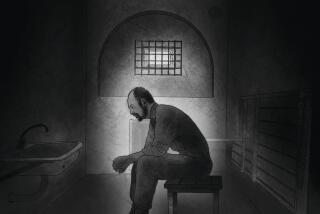Shcharansky’s Great Work Still Leaves Much to Be Done
- Share via
After serving almost nine years in Soviet prisons and labor camps, Anatoly Shcharansky is free.
His release is due in large measure to an intense and highly effective campaign on his behalf by Jewish organizations and others here and abroad. Owing to these efforts, Shcharansky, 37, has come to symbolize the struggle to allow Jewish emigration from the Soviet Union. Shcharansky was also a central figure in the effort to monitor human rights in the Soviet Union, a movement that is now in serious jeopardy.
Shcharansky’s contributions to both movements are remarkable. Trained as a computer scientist, he became a prominent social activist while still in his early 20s. Fluent in English, resourceful and highly intelligent, he linked many Moscow-based Western correspondents in the mid-1970s with Soviet human rights activists and Jewish refuseniks. A key member of the Jewish Movement for Emigration to Israel, he also helped Soviet citizens of German origin who sought to emigrate to West Germany. When the Soviet Union signed the Helsinki Accords in 1975, he worked to give them practical meaning. He focused on the language of the accord that calls for the reunification of families as one means of asserting the right to emigrate.
In May, 1976, Shcharansky joined nine others, including Andrei Sakharov, in founding the Moscow Helsinki Watch Group, the first such effort in the Soviet Union. Some credit him with the original idea of establishing the monitoring groups. He and his colleague Vitaly Rubin became the first Jewish refuseniks to publicly participate in independent human rights activity.
It was Shcharansky’s link between the dissidents and emigration activists that proved most threatening to Soviet authorities. In a recent book, “Soviet Dissent,” rights activist Ludmilla Alexeyeva concludes that the Soviet government’s decision to arrest Shcharansky and to try him for espionage was “largely determined by the fact that he had become a symbol of the increased tendency toward a unification of the Jewish movement with the human rights movement on the one hand, and with Jewish organizations in the West on the other.”
Shcharansky’s release still leaves much to be done. Today, 51 of his colleagues from various Soviet Helsinki monitoring groups are in prisons, labor camps, psychiatric hospitals or in forced internal exile. Seventeen others have left the country, and at least five have died. This week physicist Yuri Orlov, another founder of the Helsinki monitoring movement, began his 10th year in detention; Nobel laureate Sakharov is in his fifth year of forced internal exile in Gorky. Both are in poor and steadily deteriorating health.
Last week, authorities arrested 16 members of an independent peace group in the Soviet Union known as the Group to Establish Trust Between the U.S. and the U.S.S.R. Apparently this was part of an effort to remove dissidents from Moscow before the 27th Communist Party Congress convenes later this month.
The situation is equally grim for Jews who seek to emigrate. Last year just over 1,000 were allowed to do so, as compared to more than 50,000 in 1979.
While the Soviets often appear impervious to Western pressure, the campaign for Shcharansky’s release clearly made a difference. It suggests that similar efforts need to be undertaken in other cases. Simultaneously, Jewish groups and others here and abroad should continue to draw international attention to the plight of hundreds of thousands of non-celebrated Jews who still seek to leave the Soviet Union. Shcharansky’s release will bring new energy and force to this effort.
Having succeeded in Shcharansky’s case, key American Jewish organizations can and should play a more visible role on more general human-rights issues as well. There is no better place to start than with the case of Sakharov. Last week, Soviet leader Mikhail S. Gorbachev reiterated his government’s determination to deny Sakharov permission to emigrate because he possesses 18-year-old state secrets. Sakharov has committed no crime. He is being held not because of his knowledge of state secrets, but because of his beliefs. As long as the Soviets continue their shameful treatment of Sakharov, their actions must be challenged by everyone.
More to Read
Sign up for Essential California
The most important California stories and recommendations in your inbox every morning.
You may occasionally receive promotional content from the Los Angeles Times.













